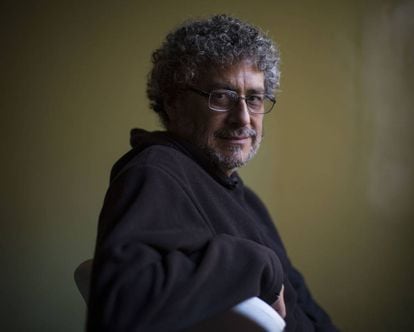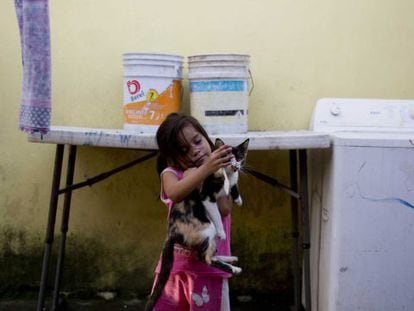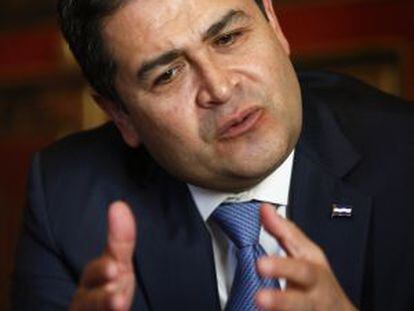How Honduran environmentalist Berta Cáceres was murdered
The only witness to the murder of the human rights and environmental campaigner has decided to speak out


It was angular, shiny and big. He could make out nothing else, except that the weapon was just two meters away and pointing at his face. Gustavo Castro threw himself to one side of the bed and instinctively covered himself with his hands. The gunman was going to kill him; he could see it in his eyes and from the way he fingered the trigger. The bullet, when it came, scraped the knuckle of his left index finger and caught his left ear, missing his forehead by a fraction. His ear bled so copiously his killer believed him to be dead.
Close by, in the next room, the Mexican ecologist and sociologist heard a desperate struggle that ended with three gunshots. By the time he got there, Berta Cáceres was lying on the floor bleeding. He scooped her up but minutes later she died in his arms. It was 11.40pm on March 2, 2016: one of the most celebrated human rights and environmental activists in Latin America had just been murdered at her home in La Esperanza, Honduras.
The murder of Cáceres came as no surprise: it was public knowledge in Honduras that she had made enemies who wanted her out of the way
The murder of Cáceres came as no surprise: it was public knowledge in Honduras that she had made enemies who wanted her out of the way. All the same, her death triggered a wave of international outrage, prompting the United States, the United Nations and the Vatican to all call for an immediate investigation.
But more than six weeks later, no details have been released by the Honduran authorities.
This lack of transparency is typical in this impoverished Central American country with a long history of human rights abuses and political instability, and where 90% of crimes go unpunished. Gustavo Castro is now Cáceres’ supporters’ last hope for justice. As the only witness, he has decided to speak out.
Castro, 51, landed at San Pedro Sula airport on March 1, the day before Berta Cáceres was murdered. As director of Otros Mundos Chiapas (Other Worlds Chiapas), he planned to give a workshop to members of the Council of Indigenous Peoples of Honduras (Copinh), founded by Cáceres. The pair had worked together in the past, but it was five years since they had seen each other.
After spending one night on the Copinh premises, Berta invited Castro to her home in La Esperanza so he could use her internet connection and speak to his family. Before that, they visited her mother, a well-known activist in Honduras, and ate at El Fogón restaurant. They then walked to Berta’s home, a small wooden house set amid waste ground ringed by a wire fence prompting Castro to remark to his friend, “Berta, this house is not safe.”
Everybody in Honduras knew that Berta Cáceres’ life was in danger. Her campaigns had angered powerful sections of Honduran society
Everybody in Honduras knew that Berta Cáceres’ life was in danger. Her campaigns for the rights of the indigenous Lenca group to which she belonged, along with her environmental activities, had angered powerful sections of Honduran society. Her most recent campaign had marked her out yet again.
Cáceres had been leading protests against the building of the Agua Zarca dam, part of a huge internationally funded hydropower project on the Gualcarque river, an area that is sacred to local people.
Her strategy of mobilizing local communities had begun to work. Both the World Bank and the Chinese state company Sinohydro have already pulled out. But local construction company firm DESA has stood its ground.
For a while it looked as though Cáceres would win the battle. Her leadership and resistance tactics earned her international recognition and the US Goldman Environmental Prize. This made her an even greater thorn in the side of powerful business interests.
One colleague from Copinh had already been killed during the campaign, while others have been tortured or injured. The mother of four was an obvious target in a country where, according to Global Witness, 111 environmental activists were killed between 2002 and 2014.
Recognizing the threat she was facing, the Inter-American commission on Human Rights ordered her protection, which meant the Honduran police should have been guarding her. They should have been, but they weren’t.
The gunman looked around the room quickly to see if anyone else was there and then fired at Castro
On the night of March 2, Castro and Cáceres arrived by car at the isolated house in La Esperanza where, as Castro recalls, “It was completely silent.” They sat on the verandah to chat and Castro smoked a couple of cigarettes. Around 11pm, they said goodnight and went to bed. Castro lay on his bed with his computer. He was putting the finishing touches to the workshop he would give the next day when he heard a loud noise. He thought something like a cupboard had fallen over. Then he heard Berta shout, “Who’s there?”
The killers had come in through the kitchen. They knew the house well. One of them went to Berta’s room and the other appeared before Castro. “They didn’t realize I would be there,” says Castro. “They were expecting to find Berta alone because her daughter had left for Mexico City the day before. It was all planned.”
The gunman looked around the room quickly to see if anyone else was there and then fired at Castro. “I was saved by a fraction of a second. If I had moved slightly before or after, I’d be dead.”
Berta Cáceres wasn’t so lucky. She took three shots to the stomach and fell to the floor, though still she managed to summon the strength to call out to Castro. “When I got there, she was dying. She asked me to phone her former husband to let him know what had happened but I couldn’t manage the keys on the phone. I said, ‘Bertita, Bertita, don’t go.’ But she didn’t last longer than a minute. She died in my arms.”
Scared the gunmen would return, Castro began making phone calls. It was two hours before help arrived; first, a friend, and later, police and journalists. The authorities immediately applied a pre-trial confidentiality order, hoping the case would eventually be forgotten. Just 12 days later, another member of Copinh was killed.
Castro and a number of organizations have demanded DESA, the local company behind the Agua Zarca project, be investigated. But so far no charges have been brought, and it is quite likely they never will be. Castro says he is aware of what he is up against, but has decided to fight. “Berta didn’t die for a river. Her work wasn’t limited to local issues. She died for something we’re all responsible for; the biodiversity of the planet. We can’t turn our backs on her cause.”
English version by Heather Galloway.
Sign up for our newsletter
EL PAÍS English Edition is launching a weekly newsletter. Sign up today to receive a selection of our best stories in your inbox every Saturday morning. For full details about how to subscribe, click here.












































